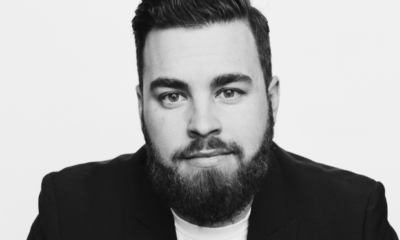Life
Here’s a Morning Routine That Will Make You Unstoppable

Get up, brush your teeth, get dressed, eat breakfast, go to work. Day in, day out. How do you begin your day? We are creatures of habit and as such, we can easily get into some humdrum habits that aren’t exactly bad, but aren’t really allowing us to live at our full potential. If you’re looking for something to give you that slight edge, look no further than your morning routine. A morning routine should not be moving through the basics as quickly as possible to get on your way to your day. A morning routine is a mindful experience that puts you on the path to a great day.
What are some habits you can start to include in your morning routine? Here’s a few to consider:
1. Hydrate
Your body is dehydrated first thing in the morning and waking it up with a glass of water is one of the most important things you can do. For a bit more flavor, try warm or hot lemon water first thing in the morning – this can help to get your digestive system moving right away. Whether you choose a glass of cold water or a hot lemon water, you will find numerous benefits to hydrating your body right away. Some of the benefits touted on both of these include improving your metabolism, improving mental performance and helping to eliminate toxins.
“If you win the morning, you win the day.” – Tim Ferriss
2. Quiet, reflective time with journaling, gratitude or meditation
Some of the most successful people start their day with some form of quiet, reflective time including Oprah Winfrey, Mel Robbins and Tim Ferriss. Each of these routines can help to reduce stress, calm the mind and can help you to take control of your mental health. These habits help to start your day on a positive note and train your brain to look for the good throughout your day. Our minds are programmed to find what they seek, so if you train your brain to look for the good, that’s what it will find and allow you to move through your day more positively.
3. Send love
This might sound a little out there, but stick with me. This method is taught by Bob Proctor, and it’s a powerful lesson in forgiveness. Once you’ve completed your journaling, gratitude and/or meditation, take a moment to close your eyes. Think of someone that you are having a challenging time with and send them love. Don’t think about what they’ve done or why you might be angry or upset with them. Simply send them love and positive energy.
It’s not so much about them, though you may find that the positive energy you send their way seems to somehow break down some of the challenges you are finding with them. It’s about you and the energy that you are putting out into the world. When you hold onto anger or keep going over the challenges in your own mind with someone else, it stays with you.
It’s like the quote from the Buddha that you’ve probably heard before: “Holding onto anger is like grasping a hot coal with the intent of throwing it at someone else; You are the one that gets burnt.” Sending love is a powerful lesson in forgiveness and letting go.
4. Get your body moving
Starting your day with exercise can help to improve your mood and increase your energy. There are numerous benefits to exercise at any time of the day. Anything you can do to get your body moving first thing in the morning, even as simple as a walk around the block or ten minutes of sun salutations, will get your blood flowing to enhance alertness and prepare you for your day. In addition, if you allow yourself the time for a full workout, you open up time later in your day that may have been used for this to do whatever you please.
“Wake up early everyday so that while others are still dreaming, you can make your dreams come true.” – Hal Elrod
5. Decide on the most important tasks for your day
Many of us write down our to-do lists, trying to rush through as much as possible. While doing as much as can be done in our day is valued, those with the habit of success know that doing the most important tasks first will move you much further along in the long run.
Take time to write down up to six tasks that would be most important for you to do today. Then number them, starting with the most important task, the thing that if you only finished one task today would move the needle the most. When you start your day, begin with this task and forget about the others for the time being. Don’t move on to the next one until this is complete.
It sounds so simple, but is a highly effective strategy for getting more done. Our minds tend to wander and want to think about the next task before we have finished the first. By deciding on what’s most important upfront, you’ll get done more quickly and have the most important thing you need to do completed so you can fully move on to the next (even if that means you don’t get to until tomorrow).
Starting your day in a positive energy can have an enormous impact on the rest of your day. Move away from the mundane and try this for a couple weeks. Watch as your life begins to transform.
Change Your Mindset
The Hidden Reason You Can’t Stay Consistent
If motivation keeps failing you, the real issue isn’t discipline. It’s the identity shaping your habits and long-term success.

Success often looks like a time-management problem. You buy a planner, set reminders, and hope that next week will be different. For a few days, it works. Then stress hits, motivation drops, and old patterns return. (more…)
Did You Know
How Skilled Migrants Are Building Successful Careers After Moving Countries
Behind every successful skilled migrant career is a mix of resilience, strategy, and navigating systems built for locals.

Moving to a new country for work is exciting, but it can also be unnerving. Skilled migrants leave behind familiar systems, networks, and support to pursue better job opportunities and a better future for their families. (more…)
Life
10 Research-Backed Steps to Create Real Change This New Year
This New Year could finally be the one where you break old patterns and create real, lasting change.

Every New Year, we make plans and set goals, but often repeat old patterns. (more…)
Life
9 Harsh Truths Every Young Man Must Face to Succeed in the Modern World
Before chasing success, every young man needs to face these 9 brutal realities shaping masculinity in the modern world.

Many young men today quietly battle depression, loneliness, and a sense of confusion about who they’re meant to be.
Some blame the lack of deep friendships or romantic relationships. Others feel lost in a digital world that often labels traditional masculinity as “toxic.”
But the truth is this: becoming a man in the modern age takes more than just surviving. It takes resilience, direction, and a willingness to grow even when no one’s watching.
Success doesn’t arrive by accident or luck. It’s built on discipline, sacrifice, and consistency.
Here are 9 harsh truths every young man should know if he wants to thrive, not just survive, in the digital age.
1. Never Use Your Illness as an Excuse
As Dr. Jordan B. Peterson often says, successful people don’t complain; they act.
Your illness, hardship, or struggle shouldn’t define your limits; it should define your motivation. Rest when you must, but always get back up and keep building your dreams. Motivation doesn’t appear magically. It comes after you take action.
Here are five key lessons I’ve learned from Dr. Peterson:
-
Learn to write clearly; clarity of thought makes you dangerous.
-
Read quality literature in your free time.
-
Nurture a strong relationship with your family.
-
Share your ideas publicly; your voice matters.
-
Become a “monster”, powerful, but disciplined enough to control it.
The best leaders and thinkers are grounded. They welcome criticism, adapt quickly, and keep moving forward no matter what.
2. You Can’t Please Everyone And That’s Okay
You don’t need a crowd of people to feel fulfilled. You need a few friends who genuinely accept you for who you are.
If your circle doesn’t bring out your best, it’s okay to walk away. Solitude can be a powerful teacher. It gives you space to understand what you truly want from life. Remember, successful men aren’t people-pleasers; they’re purpose-driven.
3. You Can Control the Process, Not the Outcome
Especially in creative work, writing, business, or content creation, you control effort, not results.
You might publish two articles a day, but you can’t dictate which one will go viral. Focus on mastery, not metrics. Many great writers toiled for years in obscurity before anyone noticed them. Rejection, criticism, and indifference are all part of the path.
The best creators focus on storytelling, not applause.
4. Rejection Is Never Personal
Rejection doesn’t mean you’re unworthy. It simply means your offer, idea, or timing didn’t align.
Every successful person has faced rejection repeatedly. What separates them is persistence and perspective. They see rejection as feedback, not failure. The faster you learn that truth, the faster you’ll grow.
5. Women Value Comfort and Security
Understanding women requires maturity and empathy.
Through books, lectures, and personal growth, I’ve learned that most women desire a man who is grounded, intelligent, confident, emotionally stable, and consistent. Some want humor, others intellect, but nearly all want to feel safe and supported.
Instead of chasing attention, work on self-improvement. Build competence and confidence, and the rest will follow naturally.
6. There’s No Such Thing as Failure, Only Lessons
A powerful lesson from Neuro-Linguistic Programming: failure only exists when you stop trying.
Every mistake brings data. Every setback builds wisdom. The most successful men aren’t fearless. They’ve simply learned to act despite fear.
Be proud of your scars. They’re proof you were brave enough to try.
7. Public Speaking Is an Art Form
Public speaking is one of the most valuable and underrated skills a man can master.
It’s not about perfection; it’s about connection. The best speakers tell stories, inspire confidence, and make people feel seen. They research deeply, speak honestly, and practice relentlessly.
If you can speak well, you can lead, sell, teach, and inspire. Start small, practice at work, in class, or even in front of a mirror, and watch your confidence skyrocket.
8. Teaching Is Leadership in Disguise
Great teachers are not just knowledgeable. They’re brave, compassionate, and disciplined.
Teaching forces you to articulate what you know, and in doing so, you master it at a deeper level. Whether you’re mentoring a peer, leading a team, or sharing insights online, teaching refines your purpose.
Lifelong learners become lifelong leaders.
9. Study Human Nature to Achieve Your Dreams
One of the toughest lessons to accept: most people are self-interested.
That’s not cynicism, it’s human nature. Understanding this helps you navigate relationships, business, and communication more effectively.
Everyone has a darker side, but successful people learn to channel theirs productively into discipline, creativity, and drive.
Psychology isn’t just theory; it’s a toolkit. Learn how people think, act, and decide, and you’ll know how to lead them, influence them, and even understand yourself better.
Final Thoughts
The digital age offers endless opportunities, but only to those who are willing to take responsibility, confront discomfort, and keep improving.
Becoming a man today means embracing the hard truths most avoid.
Because at the end of the day, success isn’t about luck. It’s about who you become when life tests you the most.
-

 Business4 weeks ago
Business4 weeks agoEntrepreneur’s Guide to Pay Stubs: Why Freelancers and Small Business Owners Need a Smart Generator
-

 Business3 weeks ago
Business3 weeks agoThe Salary Shift Giving UK Employers An Unexpected Edge
-

 Scale Your Business3 weeks ago
Scale Your Business3 weeks ago5 Real Ways to Grow Your User Base Fast
-

 Business3 weeks ago
Business3 weeks agoThe Simple Security Stack Every Online Business Needs
-

 Finances3 weeks ago
Finances3 weeks agoWhy Financial Stress Is One of the Biggest Barriers to Personal Growth
-

 Business3 weeks ago
Business3 weeks agoWhy Smart FMCG Entrepreneurs Outsource What They Can’t Automate
-

 Did You Know3 weeks ago
Did You Know3 weeks agoThe SEO Traps Even Experienced Marketers Fall Into
-

 Business2 weeks ago
Business2 weeks agoWhat Every Business Owner Should Know Before Investing in API Integration




























